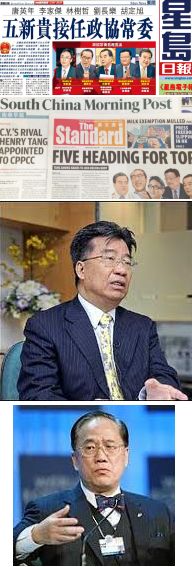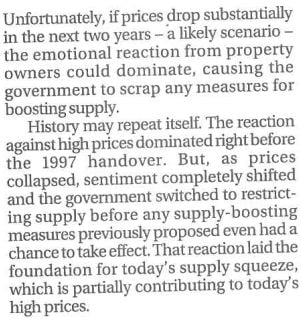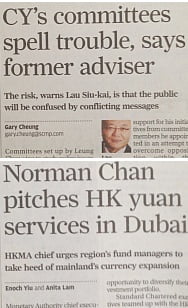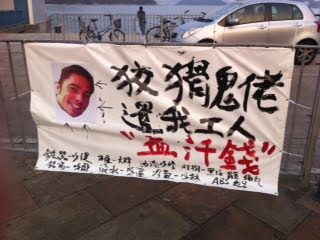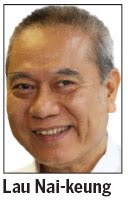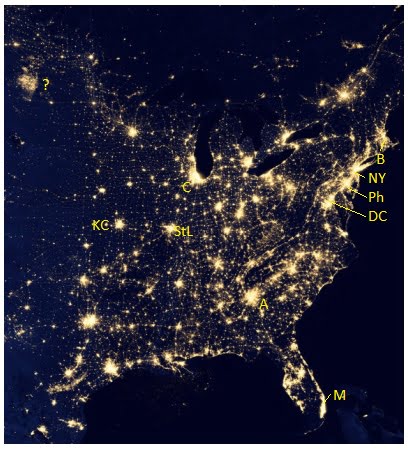The Hong Kong government gets ever more desperate in its attempts to calm public anger at the flow of infant milk formula out of the city to the Mainland, where parents fear that locally sold powder will poison their kids. Officials put the word out last week that many of the parallel traders are Hongkongers, not riffraff from Shenzhen. But that didn’t work. Then they talked of making formula subject to an obscure strategic commodity reserve system originally instituted for rice in some long-forgotten bad old days. Then they decided to try that old standby, the multi-pronged approach. Yet the smugglers are as determined as ever. Now, it’s gloves off: time to get tough.
 The government introduces the Toucan Limit. Specially trained tropical birds will patrol all New Territories rail stations and border checkpoints, ready to leap on parallel traders carrying three or more cans of milk powder and peck their eyes out with their enormous, gaily-striped, razor-sharp bills. In an uncharacteristic display of no-nonsense, screw-consensus decisiveness, authorities say children will not be spared.
The government introduces the Toucan Limit. Specially trained tropical birds will patrol all New Territories rail stations and border checkpoints, ready to leap on parallel traders carrying three or more cans of milk powder and peck their eyes out with their enormous, gaily-striped, razor-sharp bills. In an uncharacteristic display of no-nonsense, screw-consensus decisiveness, authorities say children will not be spared.
Meanwhile, far away in a classier part of town where mothers breast-feed and worry instead about political indoctrination of their offspring, we get one of those bizarre little stories that are fast becoming the hallmark of Chief Executive CY Leung’s administration. Eva Chan, who shot to her 15 minutes of fame last year opposing the proposed National Education syllabus in schools, says that an obscure CY aide called her as the controversy reached its climax, claimed to be able to speak for Beijing’s local Liaison Office, referred to the CE as ‘out of the equation’ and offered a meeting at which the Central Government emissaries would have good news. The policy was ditched days later.
You can make of it what you will. You can believe that the Liaison Office, not the CE, was – therefore, still is – micromanaging Hong Kong affairs. You can believe that the Liaison Office panicked last September that another 2003 7-1 mini-uprising was about to take place. You can believe that the Western District spooks were getting involved because national leaders themselves have called for National Education during their rare, road-closing, mega-motorcade expeditions into the Big Lychee, giving the policy some sort of sacred aura the rest of us couldn’t see. In short, it’s another bit of weirdness, like maverick businessman/politician Lew Mon-hung’s claim that CY offered him a seat on the Executive Council.
Cue Regina Ip, former Secretary for Security, and now lawmaker and leader of the New People’s Party (total membership: Regina and a pal). Eager to serve the community/convinced that her people need her/perpetually on the make, the former ‘Broom Head’ obviously sees CY’s mishaps as a looming opportunity, presumably in 2017, when Hong Kong gets to choose its leader through some sort of universal suffrage.
Regina thinks Lew Mon-hung probably was offered an Executive Council seat, but sensibly sees the funny side. People with few friends, she no doubt realizes, do whatever they have to. Regina also goes populist over the Mainland Visitor Menace and calls for limits on Mainlanders’ trips across the border.
It should be easy: you just get Mainland authorities to restrict the number of trips people up there can make to Hong Kong per day, week or whatever. (A precedent exists for Macau, though that was aimed at Mainland officials blowing public funds in the casinos.) In practice, it is fraught with difficulties.
Hong Kong’s leadership lobbied very important people in Beijing to speed up the liberalization of outbound travel for Chinese nationals to boost Hong Kong’s tourism trade after SARS. It was even presented to the public as a ‘gift’. Even if we don’t care that Mainlanders increasingly see Hongkongers as a whining, spoilt and ungrateful pain, we have to accept that there is an etiquette problem here.
More to the point, the symbolism is highly charged. In response to kids waving British-era colonial flags, Hong Kong reverses integration with its hinterland by erecting new barriers against everyone else from the People’s Republic of China. Japanese, Australians, Indians, Peruvians – all are welcome, as many times as they like. The so-called compatriots are to be singled out. This is unbelievably off-message and offensive to the deepest principles underlying Hong Kong’s return to its motherland; it is a mark not simply of public disquiet up in Sheung Shui, but of Regina Ip’s lust for power and glory. Meanwhile, our only hope lies with the plucky toucans.




